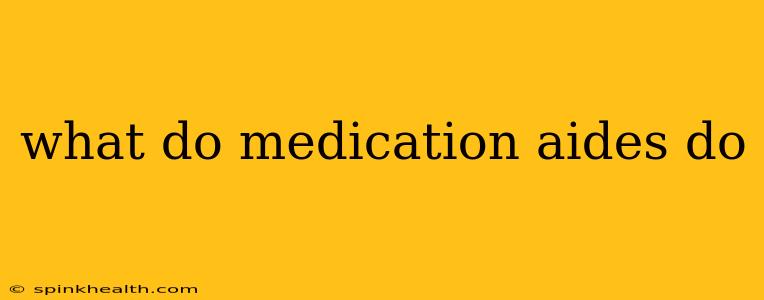What Do Medication Aides Do? A Day in the Life
The life of a medication aide is filled with responsibility, compassion, and a deep commitment to the well-being of others. It’s a crucial role in healthcare settings, particularly those focused on elderly care or individuals with disabilities. But what exactly do medication aides do? Let's delve into a typical day, exploring the multifaceted nature of this vital profession.
Imagine Sarah, a dedicated medication aide working in a bustling assisted living facility. Her day begins before most residents are awake. She meticulously checks the medication cart, verifying each resident's prescribed medications against their charts. This isn't just a quick glance; it's a thorough process involving double-checking dosages, expiration dates, and any potential interactions. Accuracy is paramount; a single mistake could have serious consequences.
Preparing and Administering Medications:
This is the core of Sarah's work. She carefully prepares each resident's medications, ensuring the correct dosage is dispensed in the correct manner – be it pills, liquids, or injections (depending on the facility's regulations and her training). She then assists residents with taking their medication, answering any questions they may have, and patiently addressing any concerns. This often involves building rapport and trust with residents, many of whom may feel anxious or uncertain about their medications.
Monitoring and Reporting:
Sarah doesn't just administer medications; she monitors their effects. She observes residents for any adverse reactions, noting changes in their behavior or physical condition. This vigilance is crucial in identifying potential problems early on. She meticulously documents everything – the time of administration, the medication given, the resident's response, and any unusual observations. This detailed record-keeping is vital for the resident's medical chart and allows healthcare professionals to track the effectiveness of the treatment plan.
Maintaining Accurate Records:
As mentioned above, maintaining accurate and up-to-date records is a significant part of the job. This meticulous record-keeping ensures continuity of care and allows for effective communication between healthcare professionals. Sarah meticulously updates charts and ensures all information is logged correctly and in a timely fashion.
What are the educational requirements to become a medication aide?
The educational requirements to become a medication aide vary depending on the state or country. Generally, it requires completion of a state-approved training program, which typically includes classroom instruction and supervised practical experience. These programs cover topics such as medication administration, record-keeping, resident rights, and safety procedures. After completing the program, candidates must pass a competency exam to obtain certification or licensure.
What are the responsibilities of a medication aide beyond administering medication?
Beyond medication administration, medication aides often have other responsibilities that contribute to the overall well-being of residents. These can include:
- Observing residents for changes in health status: Medication aides play a key role in identifying any changes in a resident’s condition and reporting them to the nursing staff.
- Assisting with other daily living activities: This could involve helping with personal care, such as bathing or dressing, or assisting with meals.
- Maintaining a clean and organized medication room: Aides are responsible for maintaining the cleanliness and organization of the medication room, ensuring the safety and security of medications.
- Communicating with residents and their families: Building rapport with residents and their families is crucial for providing quality care.
What skills are important for a successful medication aide?
Successful medication aides possess a blend of hard and soft skills. These include:
- Attention to detail: Accuracy is paramount in medication administration, making attention to detail a critical skill.
- Communication skills: Clear and effective communication is essential for interacting with residents, nurses, and other healthcare professionals.
- Compassion and empathy: Working with vulnerable individuals requires a high degree of compassion and understanding.
- Organizational skills: Managing medications and records requires excellent organizational skills.
- Patience and professionalism: Maintaining a calm and professional demeanor is crucial when working with residents who may be experiencing health challenges.
Sarah's day, like that of many medication aides, is demanding yet deeply rewarding. It's a role filled with responsibility, requiring precision, compassion, and a genuine commitment to improving the lives of others. While the specifics might differ from facility to facility, the core principles of accuracy, safety, and compassionate care remain constant in the work of a medication aide.

